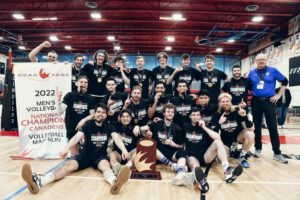The Camosun Chargers men’s volleyball team have returned from Quebec as champions.
The team brought home the national Canadian Collegiate Athletic Association (CCAA) gold medal this year, playing a perfect tournament on Sunday, March 27 to get it. The victory comes after having spent all of last year training, despite there being no games as a consequence of the pandemic.
“We did 80 sessions last year with no matches at all,” says coach Charles Parkinson. “And, you know, the guys, they deserve a lot of credit for what they were able to do, the ability to actually stay with it and train for 80 sessions knowing that there’s no games at all. That was tough.”
The team began the tournament ranked second overall, but Parkinson ensured that they stayed focused despite their good standing.

“Our goal was to make sure that we were able to handle things like the pressure, all of the fanfare that goes around these big events, and just keep focused on ourselves, and what we call ‘build the bubble,’ and insulate ourselves so that we could remain squarely focused on the key objective, which was, obviously, trying to win the championship,” says Parkinson.
The team won all three sets (25-18, 25-22, 25-21) against the hosting Titans de Limoilou in Quebec City. Charger Vitor Pereira was named MVP of the tournament, but he views the award a result of the team’s effort, not just his own.
“My main goal, and everyone’s goal, was to win the national championship,” says Pereira. “Individual awards are just a consequence of the team play. So I’m glad I got it, but if everyone wasn’t as ready and focused as they were, I would never get it. That’s a team award.”
In addition to their focus, Parkinson attributes the team’s success to their resilience.
“One of the things that has really distinguished this team from other teams in the league is their resilience; the ability to know you’re down, but to fight back,” says Parkinson. “And that resilience is such a key ingredient for winning a championship, because you’re always gonna be battling against teams that will push back, and the ability to withstand that and come out on top is a really rare, unique quality.”
Parkinson says that his approach to coaching involves growing the athlete in all areas of life, with the understanding that their top priorities are family and school.
“We make it very clear what our priorities are with regards to the program, and that you’re here as a student first. Volleyball is going to be a moment in time, but your education is going to be forever,” says Parkinson. “And we really have to make sure that we keep that perspective in mind, because at the end of the day, this is a game, and you have to have fun.”
Parkinson is grateful for the relationships, and the ability to watch his players grow, that coaching has offered him. He attributes his holistic approach, and the support offered by the college, to the success that he has maintained with his teams over the years.
“I think that’s why we’ve been so successful,” he says. “We’ve been in the provincial finals for the last seven years in a row, and we’ve won five of them. And so, to me, it might be lucky if you do that a couple times, but when you do it seven years in a row, I think we’re on to something really good here.”
Parkinson is retiring from coaching this year; he started with the with the Chargers in 2007. However, he will remain the leader of Camosun’s Sport Management program. Pereira says the team has him to thank for their successful season.
“Charles is an amazing coach, probably one of the best coaches I’ve ever had,” says Pereira. “He really knows how to manage the team and he really knows what to say in different times—he knows exactly the words to choose in difficult times, and in good times. I’m really glad that we could give him a national championship in his last year.”
